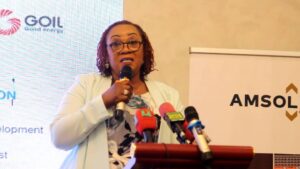Spatial Planning Project to segment Ghana’s marine resources – Minister

Mrs. Mavis Hawa Koomson, Minister for Fisheries and Aquaculture, assured that Ghana’s marine resources would be utilized efficiently through the Marine Spatial Planning (MSP) Project.
She explained that the MSP Project, which aims to promote the sustainable use of marine environments by designating areas for various activities, including fishing, tourism, and conservation, would ensure their efficient exploitation.
The minister gave the assurance in a speech delivered on her behalf at the inception workshop of the MSP in Accra.
She noted that Ghana’s marine resources are facing numerous challenges, including environmental degradation, overexploitation, overcapacity, and the impacts of climate change.
The MSP project was launched during a regional workshop in Togo in August 2024, attended by representatives from the six Forestry Commissions for the West Central Gulf of Guinea (FCWC) Member States.
The purpose of the workshop is to educate maritime sector stakeholders about the project’s details and help them gain a clearer understanding of its objectives and actions at the national level.
Mrs. Koomson remarked that the exploitation of coastal and marine resources involved multiple sectors, which could lead to conflicts and unsustainable practices.
She noted that Ghana already had a spatial development framework in place within the 200 nautical miles off the Western Region.
The framework was developed during the Mami Wata Project under the Abidjan Convention and has the potential to be expanded to encompass the entire coast of Ghana.
Mrs. Koomson stated that the Mami Wata Project introduced three tools, which included a status report from that period, the identification of significant ecosystems, and the advancement of the MSP project.
The Mami Wata project, launched in 2018 in Ghana, is an integrated ocean management initiative designed to unite all relevant government bodies, sectors, and stakeholders in the West, Central and South African Atlantic coast, for more effective and sustainable management of marine resources.
It aims to enhance national and regional efforts to harness the value of marine and coastal ecosystems through a dual approach: building capacity through training and implementing State of Marine Environment Assessments (SoME).
Mr. Antoine Gaston Djihinto, the Secretary General of the FCWC, said the implementation of the MSP project went beyond national actions and fit into a broader sub-regional framework.
He urged all FCWC Member States to fulfill their commitments under global and regional agreements focused on environmental protection, biodiversity conservation, and sustainable resource management.
Mr Djihinto noted that the project supported the objectives of international conventions, such as the Convention on Biological Diversity (CBD) and the Sustainable Development Goals (SDGs), as well as regional conservation initiatives.
He stressed the need for strong collaboration among all project stakeholders to foster a world where spatial planning, ecosystem service valuation, and nature-based solutions are central to their efforts.
Source: GNA
